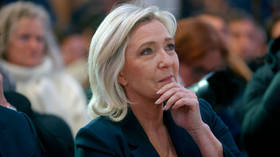‘Not compatible’ with democracy or the only way to keep the internet free? Facebook sparks debate after ‘unfriending’ Australia
Facebook’s decision to block Australians from sharing content on its platform in response to a divisive draft law backed by Canberra has splintered public opinion and reignited debate about Big Tech’s role in open societies.
The Silicon Valley behemoth announced on Wednesday that Facebook users and publishers in Australia will not be allowed to share and view news from local and international outlets. The controversial move comes as Canberra pushes forward with proposed legislation that would require Facebook and other companies to pay news creators for their content. The law would also force tech firms to be more transparent about algorithms that help curate news stories on their platforms.
Campbell Brown, Facebook’s vice president of global news partnerships, insisted that the draft legislation does not take into account the “fundamental nature of the relationship between our platform and publishers,” stressing that the social media giant “does not steal news content.”
Prime Minister Scott Morrison fired back at Facebook’s “arrogant” and “disappointing” decision to “unfriend” Australia, stating that the ban had prevented government-run pages on the platform from carrying out “essential information services.”
Pundits, politicians, and internet observers seemed split on the issue, with some taking Morrison’s position, while others argued Facebook had no other choice.
British computer scientist Timothy Berners-Lee, who is credited as the creator of the World Wide Web, said on Thursday that the proposed Australian code would violate “a fundamental principle of the web by requiring payment for linking between certain content online.”
Many others felt that Facebook couldn’t be blamed for taking action, describing the idea of paying to allow users to share links and content as illogical and, as Berners-Lee argued, contrary to the spirit of the World Wide Web.
I don’t blame them - the Australian government wants media companies to get PAID by Facebook and Google for broadcasting their articles?? Is that for real??? It will backfire - Facebook and Google will stop linking to their sites .....
— The Verb (@PeeVerbs) February 18, 2021
Although the Australian code seeks to protect domestic news outlets, some in the media said the law would have the opposite effect. Writer Casey Newton argued that in practice, the law would enrich legacy media outlets, leading to further consolidation within the news industry.
The thing about Australia’s deal with Google — and one it might still reach with Facebook — is that it’s bad for *journalism*. https://t.co/tPkqOty9VTpic.twitter.com/rvtXeRTip7
— Casey Newton (@CaseyNewton) February 18, 2021
But there were plenty of passionate defenders of Australia’s draft law who heaped scorn on Facebook’s decision.
US Rep. David Cicilline (D-RI) claimed that the tech giant had proven once and for all that it was not “compatible” with democracy.
“Threatening to bring an entire country to its knees to agree to Facebook’s terms is the ultimate admission of monopoly power,” he tweeted.
Progressive pundit and writer Matt Stoller accused Facebook of censoring the entire country of Australia, describing the move as a dangerous demonstration of the company’s influence and power.
Other journalists shared similar concerns, saying Facebook’s actions should scare anyone concerned about corporate power and overreach.
If Australia folds in response to Facebook demands, the message will be pretty clear -- a big tech company holds more influence than a sovereign government with the world's 18th largest GDP. That should scare you.
— Mark Hemingway (@Heminator) February 17, 2021
Not everyone took the feud so seriously. One blue checkmark joked that soon no one, anywhere, would be able to share links on Facebook.
Facebook banning users from posting news content in Australia is a good start towards Facebook not letting any users post
— Emily G (@EmilyGorcenski) February 17, 2021
Google, which has also been targeted by the proposed Australian law, has already ironed out a deal to share revenue with Rupert Murdoch’s News Corp group, which owns numerous Australian, UK, and US titles, including the Wall Street Journal and the New York Post. The deal will allow Google to feature the publications in its News Showcase service.
Like this story? Share it with a friend!
















